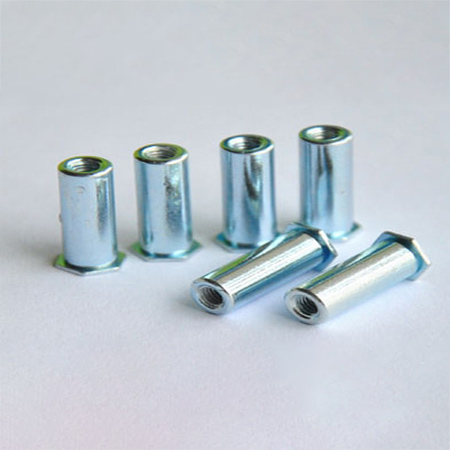Pressure Riveting Studs, also known as Blind Rivet Nuts or blind threaded inserts, play a pivotal role in various industries due to their versatility, reliability, and ease of installation. In this article, we delve into the diverse applications of Pressure Riveting Studs across different sectors, including automotive manufacturing, aerospace, electronics, and more.

Automotive Manufacturing:
In the automotive industry, Pressure Riveting Studs find extensive use in various applications such as body assembly, interior trim, and chassis components. They are employed for fastening components in tight spaces where access is limited, providing a secure and durable connection. Additionally, Pressure Riveting Studs are favored for their ability to join different materials, including metals, plastics, and composites, making them invaluable in modern automotive design and manufacturing processes.
Aerospace Industry:
The aerospace sector demands components that offer exceptional strength, reliability, and lightweight properties. Pressure Riveting Studs meet these requirements and are widely utilized in aircraft construction, interior fittings, and avionics assembly. Their ability to create strong and vibration-resistant joints without requiring access to the backside of the workpiece makes them ideal for aerospace applications where weight reduction and structural integrity are paramount.
Electronics and Electrical Equipment:
Pressure Riveting Studs play a crucial role in the assembly of electronic and electrical equipment, including consumer electronics, industrial machinery, and telecommunications devices. They are commonly used to fasten components such as circuit boards, heatsinks, and connectors to enclosures or chassis. The non-conductive nature of certain stud materials makes them suitable for use in electronic devices where electrical isolation is required, ensuring reliable performance and safety.
Construction and Building Industries:
In the construction and building sectors, Pressure Riveting Studs are employed for various applications, including steel framing, façade installation, and HVAC systems. They facilitate rapid and secure attachment of structural elements, cladding panels, and fixtures to building structures. Pressure Riveting Studs offer advantages such as high load-bearing capacity, corrosion resistance, and the ability to create strong joints in thin or brittle materials commonly used in construction projects.
General Manufacturing and Machinery:
Across diverse manufacturing industries, Pressure Riveting Studs find applications in the assembly of machinery, equipment, and industrial components. From agricultural machinery to household appliances, these fasteners provide a reliable means of joining components, panels, and enclosures. Their versatility, ease of installation, and ability to accommodate varying material thicknesses make them a preferred choice for manufacturers seeking efficient and cost-effective assembly solutions.
In conclusion, Pressure Riveting Studs are indispensable components across a wide range of industries, offering versatile and reliable fastening solutions for diverse applications. Whether in automotive manufacturing, aerospace, electronics, construction, or general manufacturing, these fasteners continue to play a vital role in advancing efficiency, durability, and innovation across various sectors. As industries continue to evolve, Pressure Riveting Studs are poised to remain essential components in the quest for enhanced performance and productivity.